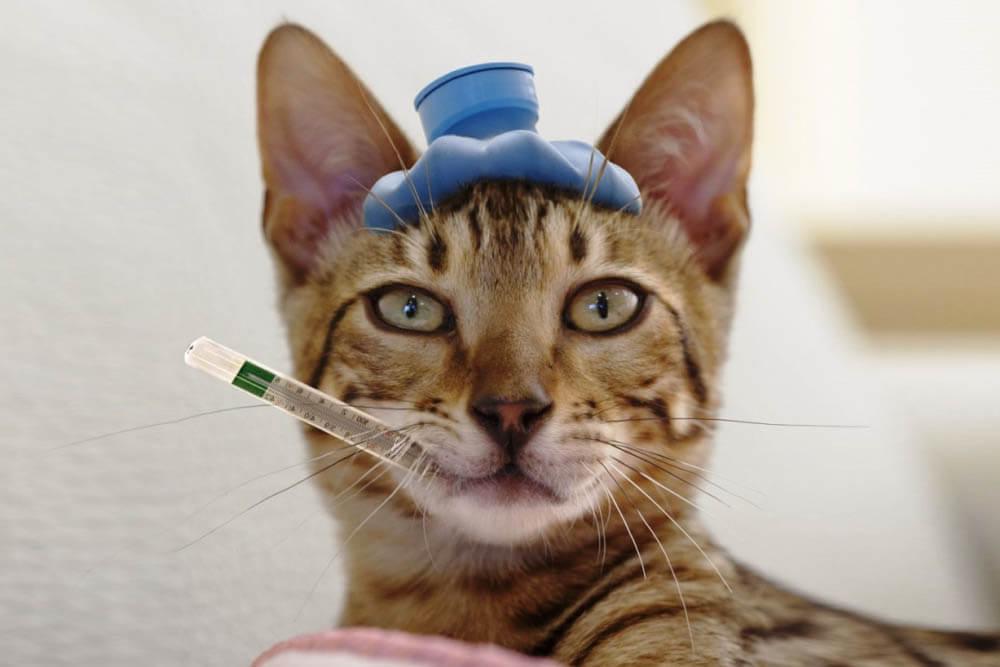
Cats are masters at hiding illness and pain. It’s common for veterinarians not to see a cat until she is very ill. Oftentimes, catching an illness as early as possible gives you the best chance at a positive treatment outcome. Thus, it’s important for you, as a cat owner, to be able to recognize possible signs that your cat is ill. Here are several signs that your cat may need to see her veterinarian.
1. Eating Habits
If your cat starts eating more or less than usual, it could signify that he isn’t feeling well. Many conditions in cats, such as hyperthyroidism, diabetes, and kidney disease are linked to appetite changes.
2. Elimination Habits
Constipation, diarrhea, and blood in the urine are all signs that your cat is ill. Additionally, if your cat begins eliminating outside of the litter box, she may not be feeling well. Urinating outside the litter box can be an indicator of a urinary tract infection. It’s always important to get your cat checked out by her veterinarian if she’s eliminating outside the litter box instead of assuming the problem is behavioral in nature.
If your cat is straining in the litter box and cannot urinate, take her to the vet or your nearest veterinary emergency room immediately. Your cat could be suffering from a blockage that is life-threatening, especially for male cats.
3. Grooming Habits
A lack of grooming as well as over-grooming may also indicate that your cat isn’t feeling well. If your cat isn’t grooming himself, he could be in pain from arthritis. If his coat looks dull or greasy he may have a skin condition that needs to be addressed. If your cat begins to groom excessively, he may be suffering from a skin parasite, such as mange or fleas.
4. Changes in Activity Level
If a middle-aged to older cat suddenly becomes much more active, it could signify that she has hyperthyroidism. If your kitty appears to be unmotivated to move around and play, she could be suffering from a painful condition, such as arthritis.
5. Drinking Habits
Increased thirst can be an indication of disease like diabetes and kidney disease.
6. Coughing
Coughing is a symptom of several conditions including allergies, asthma, tumors, heart disease, hairballs, lung disease, and some contagious diseases. If your cat coughs for more than one day, she should see her veterinarian. If your cat appears to have difficulty breathing, coughs repeatedly, or has bluish gums, she needs to see a veterinarian right away.
7. Vomiting
If your kitty vomits shortly after eating, he may have an issue. Vomiting food after it has been in the stomach for a while could signify that your kitty has a blockage, has been poisoned, or has another medical problem. You should take your cat to see his veterinarian if his vomiting doesn’t stop within a few hours or if he vomits repeatedly for more than one day. You should also take your cat to the vet if his vomiting is accompanied by a reluctance to move, diarrhea, or lethargy.
8. Behavior Changes
A classic sign that your cat doesn’t feel well is hiding. She may hide in an enclosed, quiet place, such as under the bed or in your closet. Your kitty may not want to lie on her side if she’s experiencing breathing difficulties. Your cat may be suffering from a neurological problem if she presses her head into walls or furniture for prolonged periods of time.
A change in how much affection your cat shows can also indicate a problem. If your cat is usually social and suddenly begins spending a lot of time away from you, or if your independent cat suddenly becomes clingy, it may be time to take her to the vet.
9. Changes in Vocalization
If your cat is usually talkative and becomes quiet all of a sudden, he may have a medical issue. Likewise, if your quiet cat begins to vocalize a lot, it could be a sign of conditions, such as hypertension, hyperthyroidism, and anxiety.
10. Bad Breath
Your cat’s breath will never smell minty fresh, but her breath shouldn’t smell terrible. Bad breath may indicate that your cat has gingivitis or tooth decay or something more serious like kidney disease.
While cats are very good at hiding their illnesses, knowing what to look for can help you recognize the earliest signs of illness in your cat. When in doubt, it’s always best to talk with your veterinarian about your concerns.
Related:


No Responses